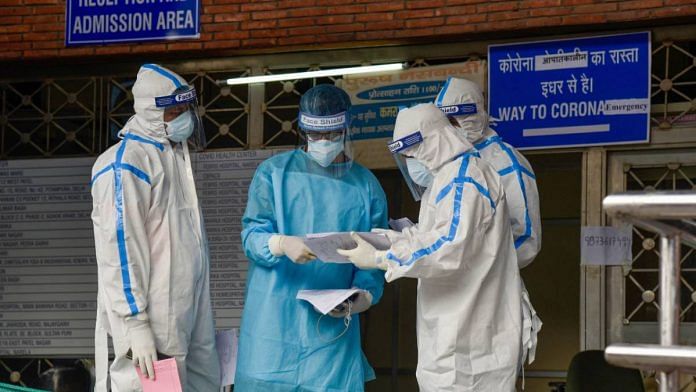New Delhi: The global coronavirus pandemic has killed more than 5,41,487 people so far in the course of over six months. Scientists across the world, however, continue to gain new insights into the virus and Covid-19 infection.
Here are some of the latest research developments on the novel coronavirus.
Asthma does not seem to increase risk of Covid-19
Patients of asthma are not at increased risk of contracting Covid-19 and neither does it influence the severity of the viral infection, a team of researchers have suggested.
Old age and conditions such as heart disease, high blood pressure, chronic obstructive pulmonary disease, diabetes and obesity are reported risk factors for the development and progression of Covid-19.
According to the researchers, people with asthma seem to be no worse affected by SARS-CoV-2 than a non-asthmatic person. This is true even if an asthmatic person has diminished lung function and is being treated to manage asthmatic inflammation.
There is limited data as to why this is the case.
The team said inhaled corticosteroids, which are commonly used to protect against asthma attacks, also may reduce the virus’ ability to establish an infection.
However, studies have shown that steroids may decrease the body’s immune response. Hence future studies should address whether inhaled steroids in patients with asthma or suffering from allergies increase or decrease the risks of SARS-CoV-2 infection.
Also read: Gomutra pills, turmeric extract, spice-mix — the Ayurvedic concoctions under trial for Covid
Hormone Epo may help manage severe Covid-19
A naturally-produced hormone called Erythropoietin (Epo), used as a medication for anaemia, could be effective in managing severe Covid-19 infections, researchers have found.
A team at the Max Planck Institute of Experimental Medicine in Göttingen has said that the drug could mitigate severe disease progression and protect patients from long-term neurological effects if Sars-CoV-2 attacks the brain.
Initial case studies have indicated a positive effect of Epo. A patient in Iran with severe Covid-19 symptoms had poor blood values and the doctors had prescribed Epo. Seven days after the start of treatment, the patient was able to leave the hospital.
The researchers are now planning a randomised clinical trial to systematically investigate the effects of Epo treatment in Covid-19 patients.
‘Silent transmission’ has to be stopped to suppress outbreak
A new study has indicated that the spread of Covid-19 through ‘silent transmissions’ — from presymptomatic or asymptomatic persons — may be much more widespread than previously thought.
Silent disease transmission during the presymptomatic and asymptomatic stages are responsible for more than 50 per cent of the overall ‘attack rate’ in Covid-19. An attack rate is the probability of an infected person transmitting the disease to another.
At least one-third of asymptomatic cases would need to be detected and isolated in order to reduce the attack rate below 1 per cent, according to the team.
The study suggests that silent transmissions alone can sustain outbreaks even if all symptomatic cases are immediately isolated.
Clinical trials begin for vaccine candidate in Australia
Human trials on a potential Covid-19 vaccine, known as COVAX-19, has commenced in South Australia.
The vaccine candidate, developed by Vaxine Pty Ltd and researchers from the Flinders University, will provide initial safety and immune response data on 40 healthy participants aged between 18 and 65 years who have been pre-screened.
Participants with receive two doses, three weeks apart, of the new vaccine or a placebo injection. They will then have blood tests to measure protective antibody and T-cell responses induced by the vaccine.
The trial also involves testing the safety and immune responses to the vaccine.
Also read: All about Bharat Biotech’s Covaxin, India’s first indigenous Covid vaccine candidate



